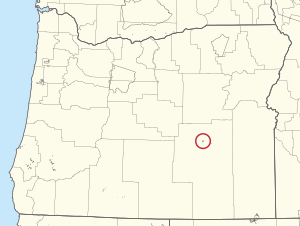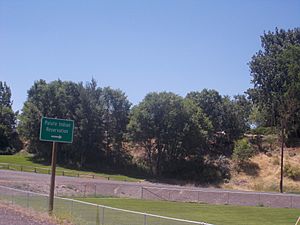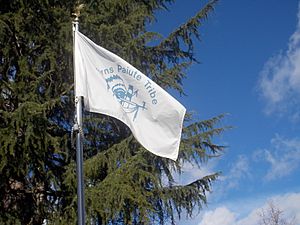Burns Paiute Tribe facts for kids
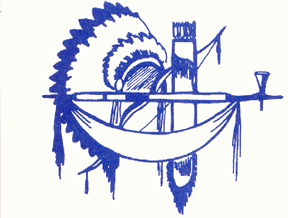 |
|
| Total population | |
|---|---|
| 349 (2016) | |
| Regions with significant populations | |
| Harney County, Oregon | |
| Languages | |
| English, Northern Paiute language, part of the Western Numic branch of the Uto-Aztecan language family | |
| Religion | |
| American Indian pantheism, Christianity, other | |
| Related ethnic groups | |
| Owens Valley Paiute, Southern Paiute |
The Burns Paiute Tribe is a Native American tribe located in Harney County, Oregon, United States. They are officially recognized by the U.S. government. Most members of the tribe are descendants of the Wadatika band of Northern Paiutes. These people traditionally lived as hunter-gatherers in parts of Oregon and Idaho. Today, the tribe has its own land, called the Burns Paiute Reservation.
Contents
The Story of the Burns Paiute Tribe
The Burns Paiute Tribe's history is rich and long. Its members are mostly descendants of the Wadatika band of Northern Paiutes. These people were hunter-gatherers, meaning they found their food by hunting animals and gathering plants. Their traditional lands stretched from the Cascade Mountains to Boise, Idaho. They also lived from the Blue Mountains down to Steens Mountain.
How the Tribe Formed
The Burns Paiute Tribe came together when many Northern Paiute people, who didn't have a permanent home, gathered near Burns, Oregon. In 1897, land was set aside for them in this area.
The Wadatika People
The Wadatika, also known as "Wada Root and Grass-seed Eaters," were a large group. They controlled a huge area of land, about 52,500 square miles. This land included the shores of Malheur Lake and parts of the Blue Mountains. They are now part of the Burns Paiute Tribe. They are also part of the Confederated Tribes of Warm Springs. The U.S. government officially recognized the Burns Paiute Tribe in 1968.
The Hunipuitöka People
Another important group was the Hunipuitöka, or "Hunipui-Root-Eaters." They were sometimes called "Snake Indians." Their homes were along the Deschutes River, Crooked River, and John Day River in Central Oregon. They are also officially recognized as part of the Burns Paiute Tribe.
The Burns Paiute Reservation
A reservation is land set aside by the government for a Native American tribe. The Burns Paiute Tribe owns about 13,736 acres of reservation and trust land. All of this land is located in Harney County, Oregon. The tribe also has a small area called the "Old Camp." This is about half a mile west of Burns. There are also 71 smaller pieces of land, called allotments, about 25 miles east of Burns.
The tribe's main reservation is called the Burns Paiute Reservation and Trust Lands. It is also known as the Burns Paiute Indian Colony. This land is located just north of the city of Burns. The reservation was officially created on October 13, 1972. Before that, in 1935, more land was bought for the tribe. This land is located northwest of Burns.
Who Are the Burns Paiute People?
The number of people in the Burns Paiute Tribe has changed over the years. In 1985, there were 223 tribal members. By 1992, 356 people were officially enrolled in the tribe. In 2008, there were 341 enrolled members. About one-third of them lived on the reservation. At that time, they were the smallest federally recognized tribe in Oregon. In 2016, there were 349 members of the tribe.
The Paiute Language
The Burns Paiute people traditionally spoke the Northern Paiute language. This language is part of a larger language family called Uto-Aztecan.
Culture and Traditions
The Paiute people have many rich traditions. They are known for their beautiful baskets. They used natural materials like willow, sagebrush, and tule plants to make them. They also made sandals, fishing nets, and traps. Today, tribal members still make beads and drums.
Sharing Stories
Tribal members have worked on a special project to record the memories of their elders. This is called an oral history project. It helps keep their stories and traditions alive for future generations.
Annual Celebrations
The tribe holds several important celebrations each year. They have an Annual Mother's Day Powwow. A powwow is a gathering where Native American people celebrate their culture. The tribe also celebrates its Reservation Day Festival and Powwow every year on October 13. This day honors the anniversary of when their land became an official reservation.
Economy and Business
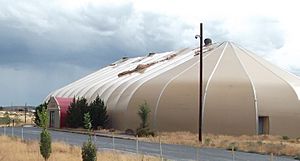
To help their economy, the Burns Paiute Tribe opened a business called the Old Camp Casino. It was located outside of Burns. The casino opened in 1998. It was a large building, about 17,000 square feet. It had a casino, a restaurant, a bingo hall, and an arcade. There was also a gift shop and places for meetings. The casino also had an RV park for visitors.
Casino Closure
Sadly, the tribe closed the casino on November 26, 2012. They had to close it because of safety concerns. There were problems with the building's structure, making it unsafe.
 | Valerie Thomas |
 | Frederick McKinley Jones |
 | George Edward Alcorn Jr. |
 | Thomas Mensah |


